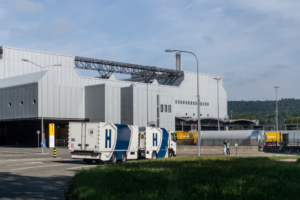Communication Gaps: The Hidden Cost Driver in Global Logistics
In international value transport, precise and complete communication is crucial for managing costs, schedules and security. Delays or ambiguities can quickly lead to significant risks. Through defined standards and clear responsibilities, we ensure that all information reaches our clients accurately and on time.
International network of agents
A key competitive advantage lies in our own steadily expanding locations combined with an international network of agents. We personally select our partners worldwide, assess their quality according to strict criteria, and visit vault facilities on site. This ensures that every stage of our supply chain meets the highest standards – flexible, reliable and uncompromisingly secure.
Global reach, local quality
A key element is the mandatory pre-alert for all our shipments. These include all agreed details – from the exact delivery time and mode of transport to the responsible customs agents. Through this proactive communication, we avoid waiting times, delays and additional costs. At the same time, we closely coordinate all processes with customs authorities to systematically reduce risks such as delivery delays or unexpected expenses.
Our global structure of owned locations and selected partners covers all major markets – from Frankfurt and London to New York, Singapore, Hong Kong and Tokyo, as well as other key international financial centres. This allows us to offer our clients global reach combined with locally verified quality.
For our clients, this means maximum planning reliability, fast customs clearance, and the constant assurance that their valuables are in the best hands – no matter where the journey leads.


End-to-end traceability
Another key element is the end-to-end traceability of each shipment. Clients want to know at all times where their goods are and whether everything is proceeding according to plan. A current status report must be available at every stage. The Proof of Delivery (POD) plays a particularly important role — this delivery document must be provided as quickly as possible to trigger payment releases or initiate further process steps.
Internal communication as a key success factor
Efficient logistics processes start internally. Close coordination between scheduling, transport management and customs handling is essential to minimise sources of error and enable swift decision-making. We therefore promote an open communication culture. Each shipment passes through defined internal handover points, ensuring that all parties are informed about the current status at all times.
Proactive rather than reactive communication
Effective communication is not merely reactive but primarily proactive. We provide early updates on status, potential risks and recommended actions. This approach creates reliability, fosters trust and prevents unexpected operational issues.
For us, proactive communication means always being one step ahead – not reacting only when a problem arises, but identifying potential deviations or delays in advance and taking targeted countermeasures. This enables our clients to maintain full control over their processes and make informed decisions before critical situations occur.
Another key aspect is the continuous availability of our contact persons. We ensure that all relevant information is communicated promptly and completely. This transparency builds trust and allows our clients to focus on what truly matters – their core business.
In the long term, this approach leads to a significant reduction in miscommunication, administrative effort and operational disruptions. Rather than reacting to incidents as they occur, we establish structures that proactively minimise risks and enable stable, reliable collaboration.








